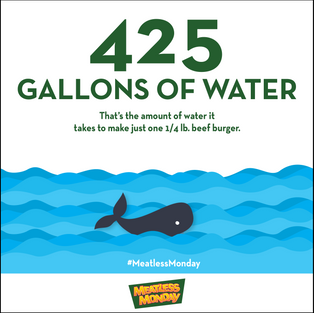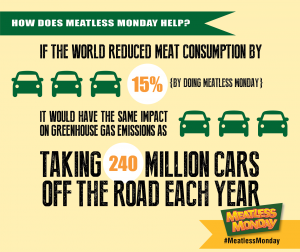THE DAY ALL HEALTH BREAKS LOOSE
- Jean Culver
- Dec 5, 2019
- 3 min read
I'm sure we've all heard about the #MeatlessMonday craze! Well, ever wonder how or where it started? Actually it isn't a new idea at all.

Back in the 1910's during WWI, the U.S.Food Administration urged families to reduce consumption of key staples to aid the war effort. The government proclaimed, "Food Will Win the War", and 'Meatless Monday' and 'Wheatless Wednesday' were introduced to encourage Americans to do their part. More than 13 million families signed a pledge to observe these conservation days. The campaign then relaunched during WWII to help the war's efforts on the home front.
So how and why the modern day's #Meatless Monday? Well, it began with the non-profit initiative of 'The Monday Campaigns' in association with the John Hopkins Bloomberg School of Public Health's 'Center for a Livable Future'.
The theme addresses the prevalence of preventable illnesses associated with excessive meat consumption; the average American eats as much as 75 more pounds of meat each year than in generations past. The message of 'one day a week, cut out meat' is a way for each person to do something good for themselves and good for our planet!
A Global Movement
Why has Meatless Monday grown into a global movement powered by a network of participating individuals, hospitals, schools, work-sites and restaurants around the world?
The simplicity of the message allows the campaign to be embraced, talked about and shared all around the world, and the health benefits of reducing meat consumption just one day a week are regular stories in news outlets.
Research shows that Monday is the perfect day to make small, positive changes because 'Monday is the day all health breaks loose'. Simply repeating this cycle of change, at the beginning of the week, 52 times a year, is easy and allows people to commit to all kinds of healthy behaviors.
Health Benefits
Countless studies show a diet emphasizing a variety of foods; including plant-based proteins like tofu, soy, beans, legumes and nuts, reduce health risks.
Plant-based meals help keep cholesterol levels low therefore protecting your heart. Diets full of veggies and whole grains and low in processed meats also reduce the risk for type 2 diabetes.
Eating less processed foods and more of the veggies can even decrease your risk for obesity. The nutrients including fiber help you feel full while also being low in calories and sugar.
Studies also show that consuming a lot of red meat can increase chances for colorectal cancer. Even if you do not eat a lot of red meat, a diet rich in plant based foods can decrease the risk for all types of cancer because of the abundance of antioxidants and other nutrients.
Protein Sources
Protein is necessary for life. So what are some protein choices for your 'Meatless Monday'?
Protein needs can and should be adequately met with a variety of foods. Eggs, tofu, soy products, beans, legumes and nuts are all good examples of plant-based proteins. Think about this - just one ounce of almonds provides six grams of protein (about the same amount you'd find in one ounce of meat).
Plant proteins however, have no cholesterol, are a great source of fiber and contain mostly heart-healthy monounsaturated fat.
Our Planet
Did you know - the amount of water and land required for plant-based agriculture, compared to livestock is significantly lower?
Eating less meat (just one day a week) helps contribute to reducing greenhouse emissions from the production and transportation of livestock.
Eating one less burger a week is the same as taking your car off of the road for 320 miles. Skipping steak for a week, is the equivalent of not driving for almost 3 months! And, if a family skipped meat and cheese one day a week, that would be the equivalent of not driving for five weeks or reducing everyone’s daily showers by 3 minutes!
Think about this - the world’s cows eat enough to feed 9 billion people. Approximately 70% of deforestation of the Amazon is to provide land for cattle ranches. Producing an 8 oz steak requires 900 gallons of water.
Not all meat though requires the same amount of energy. Pigs produce half as much carbon dioxide as cows. Chicken is the most energy efficient meat.
So, think twice before eating that burger. Even if only one day a week, skipping the meat does have an impact!










Comments